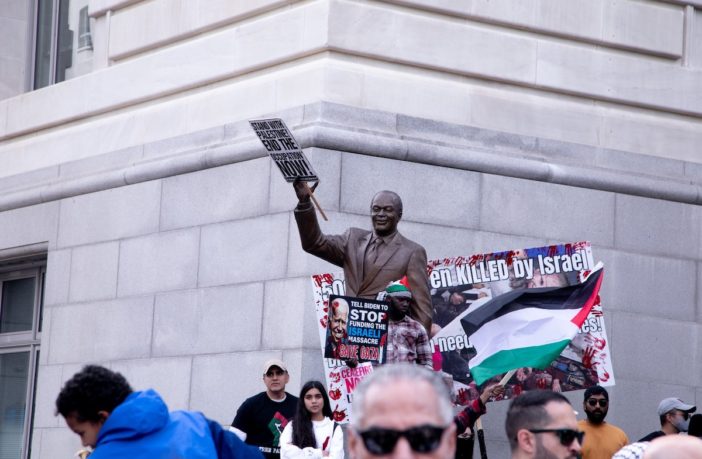Recently, author, speaker and writer Leron L. Barton encapsulated the substance of solidarity between African Americans and Palestinians in remarks that provide one possible explanation for the persistence of pro-Palestine demonstrations at the White House and across the country.
Significantly, Barton’s Newsweek opinion piece emphasizes to readers the reasons why President Joe Biden will persistently encounter obstacles in securing the kind of Black community support for his first election.
“Black American and Palestinian solidarity is not only rooted in struggle but hope, fighting, resilience, laughter, endless battling, sadness, and doing it all over again the next day,” Barton observed. “This is what I see for my Palestinian brothers and sisters trying to hold on to a land that does everything it can to make them let go.”
Barton noted that the challenges encountered by African Americans and Palestinians are intricately interconnected.
“This is why I cry for the deaths of Palestinian and Israeli people,” he declared. “This is why I do not refer to it as ‘The Conflict,’ but as ‘The Occupation.’ This is why I have hope for and will continue to support Palestine as they fight to be recognized as people, human beings that deserve freedom and equal treatment as their Israeli neighbors, just as I, a Black man, will continue to fight for the freedom of my people in America. Our struggle is intertwined. When they win, we win.”
Michael Fishbach’s 2018 book “Black Power and Palestine: Transnational Countries of Color” concurs with Barton. Fishbach extensively examines the impact that Middle Eastern conflicts had on the American civil rights movement.
“Much about how American peoples of color create political strategies, a sense of self, and a place within U.S. and global communities,” Fishbach said. He said the repercussions of the 1960s and 1970s on the United States remain profound and structural in nature. The historical viewpoint highlights the lasting impact that these interrelated conflicts had.
Recent controversies have illuminated the complexities of solidarity movements. Black Lives Matter Chicago received criticism for posting a graphic that appeared to celebrate Hamas’ violent attack on civilians at a concert. The graphic has since been deleted. The image featured a paraglider with the Palestinian flag and the words “I stand with Palestine.” The group later clarified, stating, “We stand with Palestine and the people who will do what they must to live free.”
Scholars say that the link between the difficulties of Black Americans and Palestinians has been clear for a long time. Because the protests over the Gaza war and the shooting of Michael Brown in Ferguson, Missouri, happened close to each other, people from different cultures shared tips on how to deal with tear gas. Bassem Masri, a well-known activist in Ferguson and a Palestinian American, was one of these people. In 2015, Black activists and Palestinian advocates showed their support for each other by going to occupied areas and publicly declaring support for each other.
In 2020, nationwide demonstrations ensued in response to the police killing of George Floyd, which sparked parallels to the predicament encountered by the Palestinian people. Scholar Sam Klug, an authority on African American history, drew attention to the parallel meaning of the expression “I can’t breathe” in both instances.
“People were painting George Floyd murals in Palestine,” Klug explained. “Palestinians were being attacked by Israeli security services, and saying, ‘I can’t breathe.’ Over time, African Americans have looked at Palestine, and Palestinians have also looked at what is going on in the United States.”
Because of this, Democrats are becoming more aware of the problems experienced by Biden’s reelection campaign. There have been concerns and even alarms raised about Biden’s support among Black voters, who propelled him in 2020. Cliff Albright, who helped start the Black Voters Matter Fund, said backing Biden for practical reasons might not mean being as excited about him. Albright told the Washington Post that voters may not be as interested in the 2024 race because they are disappointed with Biden’s position on Israel.
“People fundamentally misunderstood what Black voters said in 2020,” Albright said. “The depth of support was never there. The enthusiasm was never there for Biden. We were very pragmatic. We knew he was the best chance to beat Trump.”



